With umpteen collections per year and production in low-wage countries like China or Bangladesh, the fashion industry does not have a reputation for being green and sustainable. Will a virus lead to the sector reinventing itself? We spoke to four Brussels designers who had opted for sustainable and locally produced collections long before this crisis struck.
© Saskia Vanderstichele
| Conni Kaminski, Ester Manas, Jean-Paul Lespagnard, Valérie Berckmans
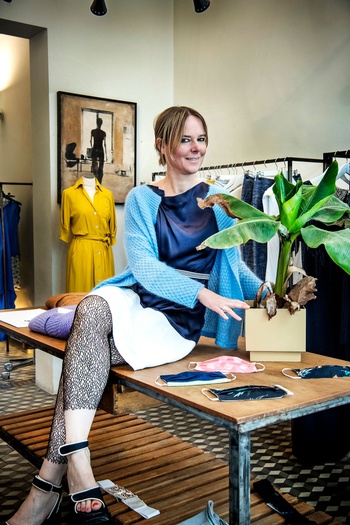
© Saskia Vanderstichele
Conni Kaminski: German-born designer with a love for asymmetrical designs and delicate knitwear
“I tried to maintain my work rhythm, and I sometimes even imagine that my shop is still open.” Conni Kaminski cycles almost daily from her home in Laken/Laeken to her shop and studio in the heart of Brussels. “I convert my stress into creativity. However strange and terrifying the situation is, I always try to see the silver lining. I was very worried, of course, but the support measures that have been announced in Brussels have relieved some of the stress. Profit and loss are the last things that I want to worry about at the moment. Concerns like that only lead to having less grasp of the situation, which is already difficult enough.”
The German-born designer opened her flagship store in the Sint-Jacobs/Saint-Jacques neighbourhood in 2008. Kaminski's label prides itself on its sustainability. Asymmetrical designs and the delicate knitwear are all made in Belgium. “Why would you produce abroad? Having my producers nearby means that I can just continue to work, though this crisis has caused a major shift. 'Think globally, act locally,' this is the moment of truth.”
I hope that we don’t just revert to our old ways when the crisis is over
The cheerful designer murmurs over the telephone about the rest that has descended on Brussels: there are hardly any noisy aeroplanes that fly over or busy traffic on her bike ride to and from her studio. Less pollution, too. “I hope that we don't just revert to our old ways when the crisis is over, but that we learn lessons from it and carry these new habits forward into the future. How nice it would be if laws were changed now to keep this city liveable.”
Kaminski is not yet thinking about a new collection, but there is time now that the sales have been postponed. Nevertheless, she is working harder than ever. “I've completely lost the weekend feeling,” she laughs. “But I don't mind. It is not as though you can do anything anyway, except for some cycling and walks to the park. I put together a web shop in a great rush. It isn't perfect and I am picking it up as I go along, but I have been able to sell some pieces from my collection. They are not all available via the web shop yet, but I add new pieces every day.”
What about the unexpected trend of 2020? “Mouth masks?” Kaminski asks laughing. “Yes, I make them too. At first only for myself, but requests soon came in from friends and family. I now also sell them via my web shop. I make them from the leftover fabric that is literally lying around my studio gathering dust. I try to add a little extra here and there, like fluorescent borders. Or I match them with pieces from the collection. There's nothing wrong with a little fun, right?”
www.connikaminski.com
.
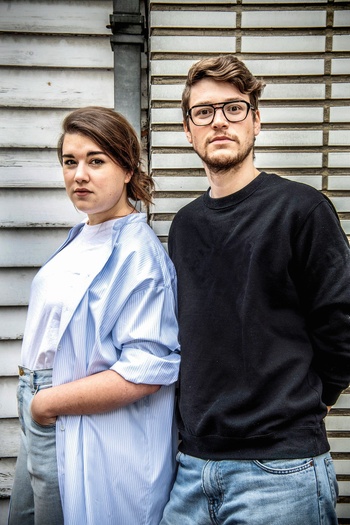
© Saskia Vanderstichele
| Ester Manas & Balthazar Delepierre, het duo achter het label Ester Manas
Ester Manas: young rebels paying tribute to the “one size fits all” philosophy
“When we returned from Paris Fashion Week at the beginning of March, Ester and I were very ill. It was almost certainly Covid-19,” Balthazar Delepierre, co-founder and creative designer of the fashion label Ester Manas tells us. “Apart from one moment on the Paris underground in which I thought I was going to die, it was not so very bad. Fortunately, nobody in our immediate surroundings is sick.” Along with designer Ester Manas, Delepierre runs the label of the same name, which pays tribute to every female form according to the “one size fits all” philosophy. “We look at this crisis positively. Now that we are not bound by appointments or meetings, we can focus our attention entirely on our new collection. And we have more time for doubt and questioning. In normal times, you have to make decisions more quickly.”
Has there not been any financial impact? Delepierre: “We do not employ any staff, so our situation is not as dire as it is for others. Moreover, we both have different jobs besides: Ester works part-time making costumes for the dance company Rosas, and I still work as an art director and graphic designer.” The label seeks to be sustainable. Their pieces are produced at a sheltered workshop in Brussels and the majority of their fabrics are sourced from unsold stock. “We try to avoid overproduction. This crisis has given us time really to scrutinise our collection and to strip away everything except the essence.”
This crisis has given us time really to scrutinise our collection and to strip away everything except the essence
The young rebels of Ester Manas are lending a helping hand in the crisis by producing mouth masks for the hospitals in Brussels. A unique piece was recently auctioned to benefit the care sector. Activism is key. “The fashion industry is crying out for change and we want to make a contribution to that in our own small way. A piece might be expensive, but it shouldn't be because of the designer's name stitched into it. It should be because the people who made the piece were paid properly. Designers want to change and don't necessarily want to go to some obscure country to produce their clothes, because it is perfectly possible to do it here. To perpetuate that change, we only have to push a button as it were. In an ideal world, our pieces would be produced in the place where they are sold, in the same way that you can download a design for a chair, for example, and then take it to a local carpenter to have it made. Wouldn't that be brilliant? We would no longer need aeroplanes to transport clothes to their destination.”
www.estermanas.com
.
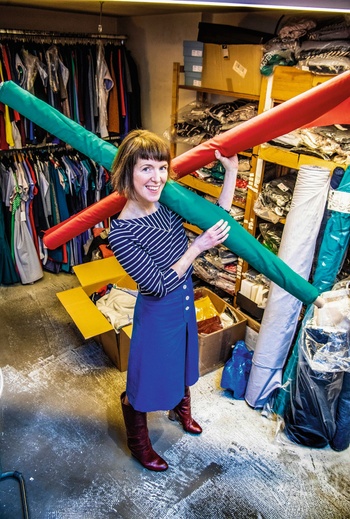
©
Saskia Vanderstichele
| Valérie Berckmans
Valérie Berckmans: thirteen years at the heart of the Brussels fashion district
“First the roadworks for the pedestrianized zone that reduced the numbers of tourists and passers-by in the Dansaert neighbourhood, then the attacks, and now this,” Valérie Berckmans sighs. For the past thirteen years, she and her boutique-studio have been based on Van Arteveldestraat/rue Van Artevelde, right in the centre. “But it is so much worse for cafés and restaurants. We are quite lucky.” With an online shop, WhatsApp sales, shopping vouchers, and a subsidy from the region, Berckmans is keeping her head above water. “The solidarity of our customers is very heartening. We are not an impersonal business, we're close to them, and that pays. More and more people are realizing how important Belgian brands and local designers are and that is a positive thing. All the fuss over the mouth masks from China proves it. We've outsourced far too many things abroad. I have known so many sewing workshops to close. And each time one disappears, it takes so much knowhow with it. It's such a shame.”
With sewing workshops in Koekelberg and France, “local and sustainable” has always been Berckmans's motto. “I don't have much hope for any great changes, but I don't want people to forget this too quickly. It would be nice if they continue to support local shops after this crisis ends.”
There is just too much of everything. You can eat strawberries in the winter and fly to Malaga for the weekend. Our lives are too decadent
“Another thing that needs to change is the speed at which big chains churn out new collections. There used to be two collections per year. Big chains now present up to six. The pressure on the seamstresses – who are often only paid 0.5% of the price a piece is sold for – must be enormous. Chains like H&M or Zara try to cultivate a greener image, but you'll never fool me into believing that you can produce an organic cotton T-shirt for 10 euro. There is just too much of everything. You can eat strawberries in the winter and fly to Malaga for the weekend. Our lives are too decadent.”
Consumers also have to change their behaviour, Berckmans says decidedly. “Everyone thinks organic cotton is better, but you also have to invest in it. I know, it is much more expensive, but that is largely due to the fact that the seamstresses are being paid properly. If we were all to buy less (and better), that would already help a great deal. I personally go for a mix of beautiful, sustainable pieces and second-hand clothes from shops like Isabelle Bajart, Gabriele, or Bernard Gavilan.”
“When I was young, I was incredibly happy when H&M and Zara opened, at the beginning of the 1990s they made fashion affordable. But now, all these years later, I know what goes on in the background. When the economy gets going again, I hope some things change. Overproduction can only be stopped through regulative and legislative means because the change is not going to come from the companies that overproduce.”
www.valerieberckmans.be
.
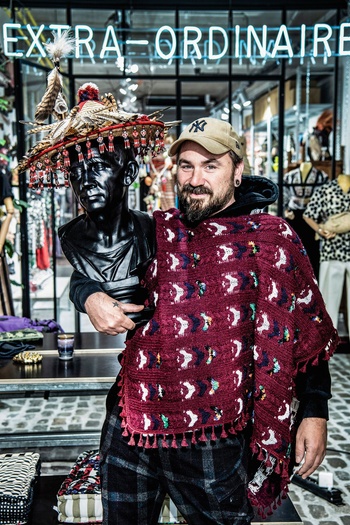
© Saskia Vanderstichele
| Jean-Paul Lespagnard
Jean-Paul Lespagnard: enfant terrible of the Brussels fashion scene and proud owner of the shop Extra-Ordinaire
“Every morning, I take a brisk walk with a good friend at a one-and-a-half-metre distance. For a tactile person like me, this feels like a video talk in real life,” Jean-Paul Lespagnard laughs via Zoom from his shop Extra-Ordinaire on Beenhouwersstraat/rue des Bouchers. The past few weeks have been quite an ordeal for him. “Opening a shop in October and having to close again only a few months later is obviously very difficult. Extra-Ordinaire is my baby project. But when we are allowed to reopen, we will be ready for it. The summer collection is already on display in the shop.”
The Brussels designer was a big star on the fashion firmament for ten years, with shows at Paris Fashion Week, an expo at the Galeries Lafayette, and collaborations with brands like Eastpak. But three years ago, he bade the traditional fashion industry goodbye. “The idea that the clothes you present will only be available in the shops six months later is crazy. You have to promote your pieces, but mentally you have already moved on. I tried to change the rules of the game, but my voice is not as loud as Yves Saint Laurent's. (Laughs) So I simply left to start playing my own game.”
The pandemic is a slap in the face, but it might actually change the economic system for the better
Jean-Paul Lespagnard is a committed designer. The crisis did not feel like the right moment to be selling clothes, objects, or design. “This is a time to help the community. Failing to react would be simply illogical. We made a tutorial to teach people how to make and use mouth masks. And we also held a fundraiser for the UMC Sint-Pieter/CHU Saint-Pierre.”
Beenhouwersstraat/rue des Bouchers is normally flooded with tourists, but the street is very quiet now. Lespagnard: “The passers-by I see now are locals who normally avoid this area. It's strange because this is not really a place for tourists, it is a place that we have abandoned to the tourists. It would be nice if locals rediscovered these places because there is so much hidden beauty here.”
How does Laspagnard see the future? “The pandemic is a slap in the face, but it might actually change the economic system for the better. I am not against production being based abroad because there is knowhow there that we no longer have. But it has to happen with respect. Small, family-run businesses that make products for us in places like India or Mexico must be paid properly. That is incredibly important, and it is of central importance to the philosophy of my shop. If we treat everyone with respect, people will automatically start taking better care of the planet. We have completely forgotten to care for the planet due to the extremely high economic pressures. This society, which focuses almost exclusively on learning and efficiency, has forgotten its traditions. Popular culture brings people together. People can inspire one another. Let us not forget that.”
www.extra-ordinaire.co
Read more about: culture , Conni Kaminski , Ester Manas , fashion , Valérie Berckmans , Jean-Paul Lespagnard
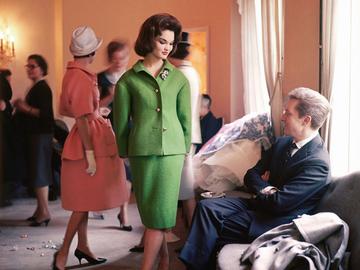

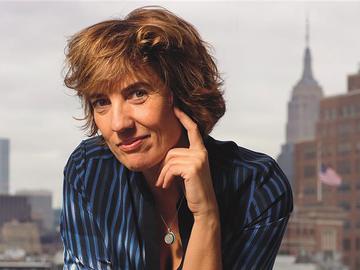
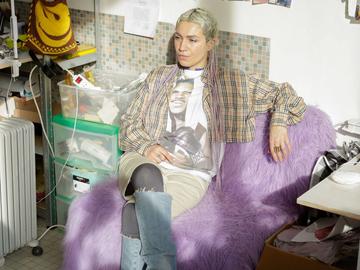
Fijn dat je wil reageren. Wie reageert, gaat akkoord met onze huisregels. Hoe reageren via Disqus? Een woordje uitleg.